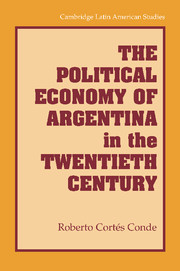Book contents
- Frontmatter
- Contents
- Acronyms
- Acknowledgments
- Introduction
- 1 Period of Rapid Economic Expansion: 1880–1914
- 2 From World War I to the Great Depression of 1930
- 3 From the 1930 Financial Crisis to World War II
- 4 The Political Economy of Peronism
- 5 A Divided Society, 1955–1973
- 6 The Long Decline
- Epilogue
- Statistical Appendix
- Bibliography
- Index
- Titles in the series
- References
4 - The Political Economy of Peronism
Published online by Cambridge University Press: 28 August 2009
- Frontmatter
- Contents
- Acronyms
- Acknowledgments
- Introduction
- 1 Period of Rapid Economic Expansion: 1880–1914
- 2 From World War I to the Great Depression of 1930
- 3 From the 1930 Financial Crisis to World War II
- 4 The Political Economy of Peronism
- 5 A Divided Society, 1955–1973
- 6 The Long Decline
- Epilogue
- Statistical Appendix
- Bibliography
- Index
- Titles in the series
- References
Summary
Introduction
There is very little about which all Argentines agree, but there is a general consensus that Peronism brought a fundamental change in the life of the country. Although the 1914 war marked the end of the Belle Epoque, certain institutions, and much of the culture of that period, endured until World War II, albeit in a somewhat altered form. Nothing would be the same after Colonel Perón stood in front of the Town Hall (Consejo Deliberante) building, now converted into the secretary of labor, and harangued the workers. Who would have thought that a military government would promote a movement that supported political participation of the workers and the defense of their rights? Given that the government had been imposed by a military clique called the Group of United Officials (the GOU) and had Nazi sympathies and a desire to repeat Franco's Spanish experiment (even, like Franco, appealing to the notion of a glorious Hispanic past), this brand of populism came as a surprise.
By no means did Perón have a vision from the beginning for the movement that kept him in power, and that lasted the entire twentieth century. Initially, although he was not the leader of the revolutionary Junta, he managed to achieve key positions in the June 4 coup d'état military hierarchy.
- Type
- Chapter
- Information
- The Political Economy of Argentina in the Twentieth Century , pp. 122 - 193Publisher: Cambridge University PressPrint publication year: 2008



